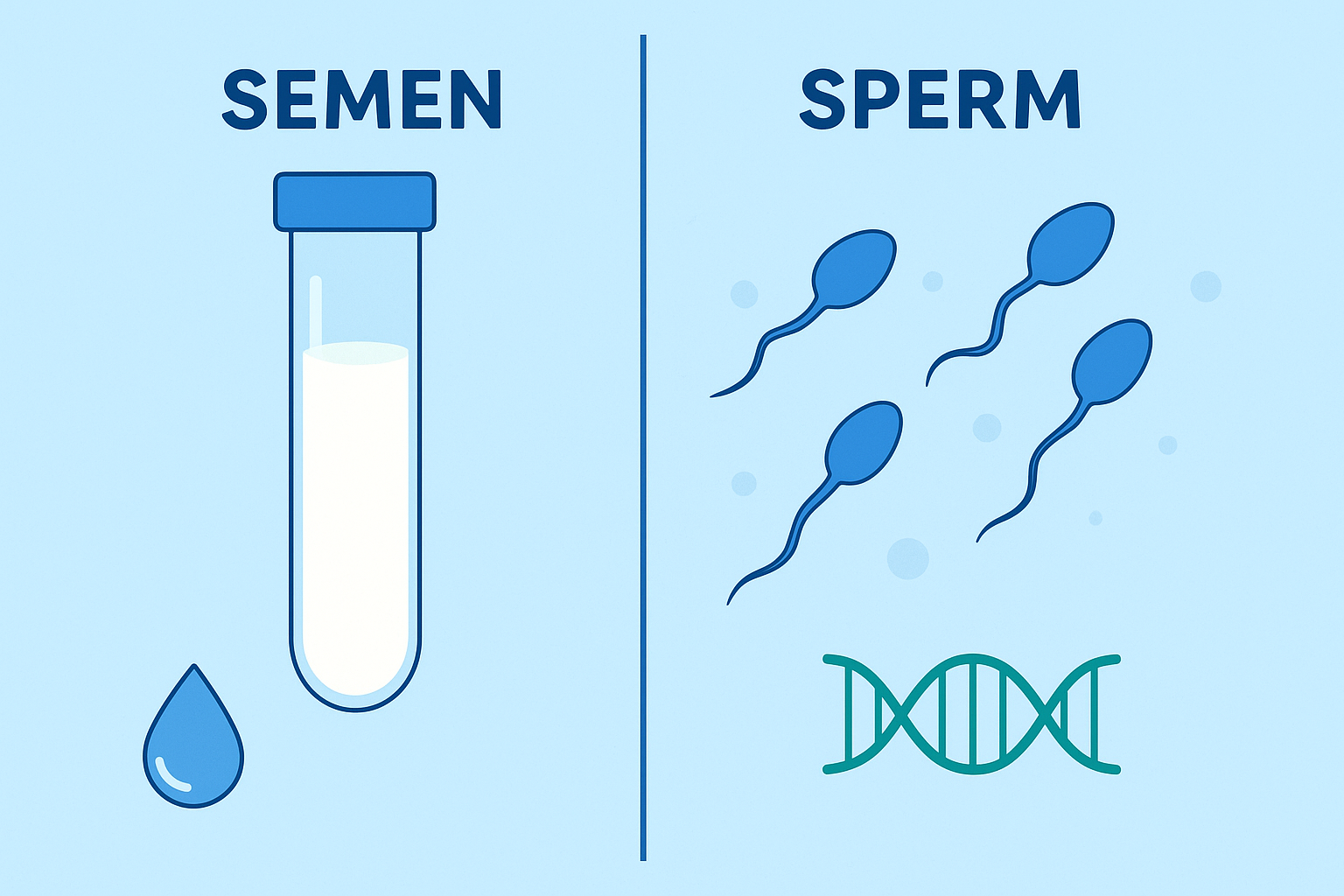Infertility is often thought to be a concern primarily for women, but it’s just as important to address male fertility when couples face difficulty conceiving. Infertility in males is just as common as female infertility, affecting about 1 in 7 men. If you’re struggling with infertility or want to know more about your reproductive health, understanding male fertility testing is crucial. In this article, we’ll walk you through the different types of Fertility tests for men, why they’re necessary, how to interpret the results, and potential treatment options.
Also read: Effective Management Strategies for Vasomotor Symptoms
Why Men Should Consider a Fertility Test
Male fertility plays a crucial role in conception. When a couple struggles to conceive, many people immediately look into women’s health, but male fertility issues can be just as important to consider. Studies show that approximately one-third of infertility issues stem from male-related factors. Men need to recognize the signs of infertility and understand that testing can help identify potential problems early on, improving the chances of successful treatment.
Sperm test kits are available in the market and one can check their sperm at home sperm test kit.
Common Causes of Male Infertility
Infertility in men can stem from a variety of issues, including:
- Low sperm count (Oligospermia): An insufficient volume of sperm may make it difficult for them to reach and fertilize the egg.
- Poor sperm motility (Asthenozoospermia): This refers to sperm’s inability to move properly, which can hinder its ability to reach the egg.
- Abnormal sperm morphology (Teratozoospermia): Poorly shaped sperm may be unable to penetrate the egg.
- Hormonal imbalances: Insufficient or excessive levels of hormones can affect sperm production.
- Physical blockages: Blockages in the reproductive system can prevent sperm from being released during ejaculation.
- Genetic factors: Conditions like Klinefelter syndrome can cause fertility problems in men.
- Varicocele: Enlarged veins around the testicles can lead to poor sperm quality.
Getting a fertility test is a crucial step in diagnosing the specific causes of infertility and determining appropriate treatment.
Types of Fertility Tests for Men
Male fertility testing involves a variety of diagnostic tools. Each test provides valuable information to assess different aspects of fertility. Here’s an overview of the most common fertility tests for men:
1. Semen Analysis
Semen/Sperm analysis is the primary test used to evaluate male fertility. This test involves collecting a semen sample, which is then analyzed to measure the quantity and quality of sperm. Key factors tested in a semen analysis include:
- Sperm Count: The number of sperm in a given volume of semen. A normal count is generally above 15 million sperm per milliliter.
- Sperm motility refers to the sperm’s ability to move forward in a straight direction. Sperm motility is crucial for reaching the egg for fertilization.
- Sperm Morphology: The size and shape of sperm. Abnormal shapes can reduce sperm’s ability to fertilize an egg.
- Seminal Fluid Volume: The amount of semen ejaculated during the sample collection. The normal volume is about 2-5 milliliters.
- pH Level: The acidity of the semen. An abnormal pH level could indicate an infection or other health issues.
- White Blood Cells: Their presence might signal infection or inflammation in the reproductive system.
This analysis is often the first step in fertility testing for men and can highlight many potential issues.
2. Hormone Testing
Hormonal disturbances are a common cause of male infertility. Hormone testing measures the levels of various hormones involved in sperm production and reproduction. The primary hormones tested include:
- Testosterone: The key male hormone responsible for sperm production. Decreased testosterone levels can lead to reduced sperm count and motility.
- FSH (Follicle-Stimulating Hormone): This hormone stimulates the testes to produce sperm. Higher levels can indicate a problem with sperm production.
- LH (Luteinizing Hormone): LH helps regulate testosterone production in the testes. Abnormal LH levels may signal an issue with the testes or the pituitary gland.
Hormone tests can help identify issues related to low sperm count, poor sperm quality, or other reproductive health concerns.
3. Physical Examination
In addition to sperm analysis and hormone testing, a physical examination is essential to detect structural issues. A doctor may assess the reproductive system for:
- Varicocele: A varicocele is an enlargement of veins in the scrotum and is a common cause of male infertility.
- Infections or Swelling: These can affect the reproductive organs and interfere with sperm production or function.
- Other abnormalities: Conditions such as hydrocele (fluid accumulation around the testes) or testicular atrophy (shrunken testicles) can also impact fertility.
Physical exams are typically used alongside semen analysis to get a comprehensive view of a man’s fertility.
4. Genetic Testing
For men who experience unexplained infertility, genetic testing may be recommended. Certain genetic disorders can lead to infertility, such as:
- Klinefelter Syndrome is a genetic condition where men have an extra X chromosome, which can affect sperm production.
- Cystic Fibrosis: Men with cystic fibrosis may have a blockage in the vas deferens, the duct that carries sperm from the testes.
- Y-Chromosome Microdeletions: Deletions on the Y chromosome can affect sperm production.
Genetic tests help identify underlying conditions that could require specific treatments or interventions.
5. Post-Coital Test
A post-coital test, or Sims-Huhner test, examines how sperm interacts with cervical mucus after intercourse. The test is done after sexual intercourse, and the sperm is analyzed for its motility and ability to survive in the woman’s reproductive tract. While not as commonly used as other tests, it can be useful in some cases of unexplained infertility.
Preparing for a Male Fertility Test
To ensure the most accurate results, it’s important to follow proper preparation guidelines for a male fertility test:
- Abstain from ejaculation for 2 to 5 days before the test. This ensures an adequate sperm sample.
- Avoid alcohol, smoking, and recreational drugs: These substances can negatively impact sperm production and quality.
- Maintain a healthy lifestyle: A balanced diet, regular exercise, and managing stress can all support fertility.
- Avoid excessive heat exposure: Refrain from using hot tubs and saunas, and wear loose-fitting clothing that can help regulate scrotal temperature, as heat can damage sperm.
By following these steps, you can help ensure accurate results from your fertility test.
What the Results Mean
After the fertility tests are completed, understanding the results is key. Here’s a breakdown of what various results may indicate:
- Semen Analysis: A low sperm count, poor motility, or abnormal morphology may suggest infertility. However, a single test isn’t conclusive, and repeat testing is often required.
- Hormone Imbalances: Low testosterone or high FSH levels could indicate a problem with sperm production. Hormone therapy may be recommended in such cases.
- Genetic Issues: Genetic abnormalities may require specialized treatments or assisted reproductive technologies.
- Physical Abnormalities: If a varicocele or blockage is found, surgical intervention may help restore fertility.
It’s important to remember that infertility is a complex issue, and the results of your tests will guide your next steps, including potential treatments.
Treatment Options for Male Fertility Issues
If fertility issues are diagnosed, various treatments may be available, depending on the underlying cause. Here are some common treatment options:
1. Medications
- Clomiphene Citrate: Often used for men with low testosterone or hormone imbalances, this medication can stimulate sperm production.
- Gonadotropins: These injectable hormones can stimulate sperm production in the testes.
2. Surgery
- Varicocele Repair: If a varicocele is diagnosed, surgical repair can improve sperm count and quality.
- Vasectomy Reversal: For men who have had a vasectomy and wish to restore fertility, a vasectomy reversal may be an option.
3. Lifestyle Changes
- A healthy diet, regular exercise, and effective stress management can all improve sperm quality. Avoiding alcohol intake, quitting smoking, and maintaining a healthy weight are essential.
4. Assisted Reproductive Technologies (ART)
- Intrauterine Insemination (IUI): Involves washing and concentrating sperm before placing them directly into the uterus.
- In Vitro Fertilization (IVF): IVF may be recommended when sperm quality is severely low. This process involves fertilizing an egg outside the body and implanting the embryo into the uterus.
Myths and Misconceptions About Male Fertility Testing
There are several myths surrounding male fertility that need to be cleared up:
- Myth: Male infertility is rare. In reality, male infertility accounts for about one-third of infertility cases.
- Myth: Men’s fertility doesn’t decline until old age. While fertility does decline with age, issues can arise earlier.
- Myth: Fertility testing is only for women. Male fertility testing is equally important for couples trying to conceive.
- Myth: One test is enough: Fertility testing often requires multiple tests to provide a complete picture of male fertility.
When Should Men Get a Fertility Test?
Men should consider getting a fertility test if:
- They’ve been trying to conceive for more than a year without success.
- They have a history of testicular issues, infections, or trauma.
- They’re over the age of 40 and concerned about age-related fertility decline.
Early testing can help identify potential issues early, giving men and their partners the best chance of successful conception.
Conclusion
Fertility tests for men are an essential part of the fertility journey, and understanding the different types of tests available can empower men to take control of their reproductive health. By identifying potential issues early, men can seek the right treatment and improve their chances of conceiving. If you’re concerned about your fertility, it’s important to discuss with a Doctor who can guide you through the testing and treatment process.
FAQs
1. How accurate are male fertility tests?
Male fertility tests, such as semen analysis, are reliable but often require follow-up tests for confirmation.
2. What should I expect during a semen analysis?
You’ll need to provide a semen sample, which will be analyzed for sperm count, motility, and morphology.
3. Are fertility tests expensive?
Fertility tests can range in cost. Semen analysis is usually affordable, while genetic testing or hormone therapy may be more expensive.
4. Can I improve my fertility?
Yes, lifestyle routine changes, such as eating a balanced diet, engaging in regular workouts, and reducing stress, can help improve sperm quality.




